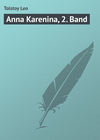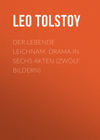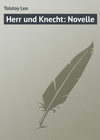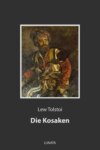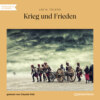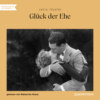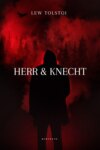Buch lesen: «Tolstoi for the young. Select tales from Tolstoi», Seite 8
VII
And the godson set out, thinking as he walked, “How can I rid the world of evil? People rid the world of evil by banishing evil men or putting them in prison or executing them. But how can I rid the world of evil without taking other men’s sins upon myself?” And the godson wondered and wondered, but could come to no decision.
He wandered and wandered till he came to a field on which tall rich corn was growing, ready to be harvested. And the godson saw a calf that had strayed in among the corn and he saw men on horseback chasing the calf this way and that and trampling down the corn. Each time the calf was about to come out of the corn some one rode up and the calf got frightened and ran back again, the men after it. In the road stood a woman, crying, “They will chase my calf to death!”
And the godson said to the men, “What are you doing? Come out of the corn and let the woman call to her calf.”
The men did so. The woman came up to the edge of the field and called to the calf, who pricked up its ears, listening awhile, then it ran towards her and buried its nose in her skirts, nearly knocking her down. The men were glad, and the woman was glad, and the calf, too, was glad.
The godson went on his way thinking, “I see that evil breeds evil. The more people try to drive away evil, the more the evil grows, which shows that it is impossible to drive out evil by evil. But how can one drive it out? I don’t know. It is well that the calf obeyed its mistress; if it had not done so, how should we have got it out of the corn?”
And the godson wondered and wondered, but could come to no decision and went on further.
VIII
He wandered and wandered till he came to a village where he asked to be allowed to stay the night at the first house. The mistress let him in. Besides herself no one was in the house. The mistress was busy cleaning.
When the godson came in he climbed on to the stove and began watching to see what the mistress was doing. She had finished cleaning the floor and was scrubbing the table. She scrubbed it and wiped it with a dirty cloth. She rubbed the cloth one way, but the table would not come clean. The cloth left streaks of dirt. She rubbed it the other way – the first streaks came out, new ones were made. She rubbed it lengthwise again and the same thing happened. The dirty cloth rubbed out one streak of dirt and left another. The godson watched for some time and then said, “What are you doing, mistress?”
“Don’t you see that I’m cleaning the house for the festival? I can’t get the table clean, anyhow. The dirt will not come off and I’m quite worn out.”
“You should rinse out the cloth, then wipe the table.”
The mistress did as he told her and the table came clean. “Thank you,” she said, “for your lesson.”
In the morning the godson took leave of the mistress and went on further. He wandered and wandered till he came to a wood where he saw some peasants making hoops. He approached them and saw them struggling and struggling, but they could not bend the wood. He looked closer and saw that the block on which they were working was not firmly fixed. And the godson said, “What are you doing, brothers?”
“Making hoops, as you see. We have steamed the wood twice, yet cannot bend it. We are quite worn out.”
“You should fix the block more firmly, mates. It moves round with you as it is.”
The peasants did so and their work went smoothly afterwards.
The godson stayed the night with them, then went on his way. He walked the whole of that day and the night and just before daybreak he came upon some shepherds encamped for the night, and joined them. They had settled their cattle and were trying to light a fire. They took some dry twigs and lighted them, and not giving them time to burn up, they put some damp brushwood on top and smothered the fire. The shepherds took some more dry twigs and lighted them, and again they smothered the fire with damp brushwood. For a long time they struggled, but could get no fire.
And the godson said, “Don’t be in such a hurry to put on the brushwood, but wait until the twigs have caught well. When the fire gets hot then you can put on the brushwood.”
The shepherds did as he told them. When the twigs had caught well, they put on the brushwood, and in a few minutes they had a blazing fire.
The godson stayed with them for a while then went on further. He wondered what these three things he had seen might mean, but could not understand, nor see the reason of them.
IX
The godson wandered and wandered until nightfall, when he came to a wood, and in the wood was a cell. He went up to the cell and knocked at the door.
A voice from within asked, “Who is that?”
“A great sinner. I have come to atone for the sins of another.”
And the hermit asked, “What are these sins you have taken upon yourself?”
And the godson told him everything about his godfather and the mother-bear and the cubs and about the throne in the sealed room, and about his godfather’s commands, and about the peasants who had trampled the corn in the field, and the calf that had come to its mistress at her call.
“I know now,” he said, “that you cannot drive out evil by evil, but I don’t know how it can be driven out and I want you to tell me.”
And the hermit said, “Tell me what else you have seen on the way?”
The godson told him about the woman and how she had tried to clean the table, and of the peasants who had tried to make the hoops, and the shepherds who had tried to light a fire.
The hermit waited until he had finished, then he went into his cell and brought out a jagged axe.
“Come,” he said.
The hermit walked away from the cell and pointed to a tree. “Cut it down,” he said.
The godson felled it.
“Chop it into three parts.”
The godson chopped it into three parts. The hermit again went into his cell and brought out a light.
“Set fire to those three logs,” he said.
The godson made a fire and burnt the three logs till only three pieces of charcoal were left.
“Now plant them half into the ground, like this.”
The godson planted them.
“Do you see a river there by that hill? Fetch some water in your mouth and water them. Water this one in the way you taught the woman to clean, this one in the way you taught the hoopers, and this one in the way you taught the shepherds. When the three pieces of charcoal grow into apple-trees you will know how to rid the world of evil, and will then have atoned for your sins.”
With these words the hermit went into his cell. The godson pondered and pondered and could not understand what the hermit had said, but he did what the hermit had told him.
X
The godson went to the river, filled his mouth with water and watered one piece of charcoal; then he went again and again, until he had watered the other two. The godson was tired and hungry. He went to the hermit’s cell to ask for some food. When he opened the door there was the hermit lying dead on a bench. The godson looked about the cell and found some rusks, which he ate; then he discovered a spade and went out to dig a grave for the old man. By night he carried water to water the pieces of charcoal, and by day he dug the grave. He had no sooner finished it and was about to bury the hermit, when some people came from the village to bring the hermit food.
When the people heard that the hermit was dead they asked the godson to take his place. They buried the hermit, left the bread with the godson and went away, promising to bring him more food later on.
And the godson fell into the hermit’s place and he lived and nourished himself with the food people brought him, and went on watering the pieces of charcoal as the hermit had bidden him do.
The godson lived thus for a year and many people began to visit him. He grew famous throughout the country as a saint who saved his soul by carrying water in his mouth from beneath a hill, and watering stumps of charcoal. People flocked to him. Rich merchants brought him gifts, but the godson used nothing but what he needed, giving the rest to the poor.
And the godson began to live thus – for half the day he carried water in his mouth to water the pieces of charcoal, for the other half he rested and received people.
And the godson came to think that he had been told to live thus and that in this way he would atone for his sins.
The godson lived thus for another year, not missing a single day for watering the charcoal, yet not a single piece had begun to sprout.
One day when he was sitting in his cell he heard a horseman gallop past, singing to himself. The hermit came out to see what manner of man he was. And he saw that the man was young and strong and was dressed in fine clothes and seated on a spirited horse.
The godson stopped him and asked him who he was and where he was going. The man pulled up.
“I am a robber,” he said; “I roam the highway and kill whomever I have a mind to. The more men I kill the merrier are my songs.”
The godson was horrified and thought, “How can one destroy evil in such a man? It is well to talk to the people who come to me; they repent of their own accord, but this man glories in the evil he does.” The godson said nothing to him and turned away, thinking, “What shall I do? If this robber makes up his mind to stay here, he will scare away my people and no one will come to see me. They will lose some good thereby, and I shall have nothing to live on.”
And the godson stopped and said to the robber, “People come to me not to boast of the evil they do, but to repent and pray for their sins to be forgiven them. You repent likewise, if you have the fear of God in your heart, and if you do not seek repentance, go away from this place and do not come back again, so as not to hinder me or scare away my people. If you fail to listen to my words God will punish you.”
The robber laughed.
“I am not afraid of your God and I won’t listen to you. You are not my master to order me about. You live by your piety, I by my robbery. We must all live. Teach the women who come to you, but let me alone. Since you have dared to mention the name of God to me I will kill two extra people to-morrow. I would kill you now, only I don’t want to soil my hands, but take care never to cross my path again.”
The robber threatened him thus and rode away. He did not come again and the godson lived in the hermitage as before for another eight years.
XI
One night the godson set out to water his pieces of charcoal and when he had finished he sat down in his cell to rest. He peered along the path now and again to see if any visitor was coming, but no one came that day. The godson sat alone until evening and he grew lonesome and weary and began to think about his life. He recollected how the robber had reproached him for living by his piety. He began to look back upon his life. “I am not living as the hermit told me,” he thought. “The hermit imposed a penance on me and I have used it as a means of earning my bread and even gaining fame thereby. I have been so led astray over it that I am even dull when people do not come to see me, and when they do come, I rejoice when they praise my saintliness. This is not the way one must live. I have been blinded by fame. Not only have I not atoned for past sins but have taken new ones upon myself. I will go away to another place far into the wood, where the people will not find me, and I will live alone there and atone for my past sins, taking care not to commit new ones.”
Thinking thus the godson took a bag of rusks and a spade, and he left the cell and set out down a ravine to build himself a mud hut in the thicket and disappear from people’s sight.
The godson was walking along with his bag and spade when the robber jumped out upon him. The godson was afraid and would have run away, but the robber stopped him.
“Where are you going?” he asked.
The godson told him that he wanted to go away from people and bury himself in a wild part of the wood where no one would come to him.
The robber wondered.
“But what will you live on if no one comes to see you?”
The godson had not thought of that, but now the robber had mentioned it he remembered that he had to eat.
“On what God gives,” he said.
The robber made no reply and went his way.
“Why didn’t I say anything to him about his life?” the godson thought. “He may be repentant now. He seemed softer of manner and did not threaten to kill me to-day.” And he called to the robber saying, “It is time you repented. You cannot get away from God.”
The robber turned his horse round, seized a knife from his girdle and brandished it aloft. The godson took fright and ran away into the wood.
The robber did not trouble to go after him, he merely said, “I have let you off twice, old man; take care not to come my way a third time, or I’ll kill you.”
With these words the robber rode away.
That evening the godson went to water his pieces of charcoal and behold! one of the pieces had sprouted! A young apple-tree had shot forth.
XII
The godson hid himself from the eyes of men and began to live alone. His rusks were all gone. “I must hunt for some roots,” he thought, but he had no sooner gone out than he saw a bag of rusks hanging on the branch of a tree. He took the bag and began to eat.
When that was all gone he found another bag in the very same place. Thus the godson lived. He had only one care – his fear of the robber. When he heard him coming he hid himself, thinking, “If he kills me I shall not be able to atone for my sins.”
Another ten years passed. One apple-tree grew up, the other pieces of charcoal remained as they were before.
One day the godson went out early to do his watering. He moistened the soil around the stumps until he was tired and sat down to rest. As he rested he thought, “I have sinned greatly in fearing death. If it be God’s will I will atone for my sins by death even.”
The thought had no sooner occurred to him than he heard the robber come along cursing at some one. And the godson thought, “Besides God no one can do me either good or evil.” And he went to meet the robber. He saw that the robber was not alone. On the saddle, behind him, was another man, and this man’s hands were bound and his mouth was gagged. The man made no sound and the robber kept on abusing him. The godson approached the robber and stopped before his horse.
“Where are you taking this man to?” he asked.
“Into the wood. He is a merchant’s son and won’t tell me where his father’s money is hidden. I will keep him prisoner until he tells me.”
The robber was about to go on, but the godson would not let him, seizing the horse by the bridle.
“Let the man go,” he said.
The robber grew angry and raised his arm to strike him.
“Do you want to share his fate? I told you I would kill you. Let go!”
The godson was not afraid.
“I won’t let go,” he said. “I’m not afraid of you; I only fear God. He tells me not to let go. Set the man free.”
The robber frowned; he seized the knife from his girdle, cut the cords and released the merchant’s son.
“Be gone, the two of you!” he said, “and don’t come across my path a second time!”
The merchant’s son fled. The robber was about to go, but the godson stopped him and once more beseeched him to abandon his wicked life. The robber stood and listened without saying a word, then turned and rode away.
In the morning the godson went to water his pieces of charcoal. Behold! another one had burst forth, another apple-tree had grown!
XIII
Ten more years passed. The godson lived desiring nothing, afraid of nothing, and a feeling of gladness always at his heart. And he thought one day, “What blessings the good Lord gives us! And we torment ourselves for nothing. People should live in joy and happiness.” And he remembered the evil men suffered and how they tormented themselves and he grew to pity them. “It is in vain that I live as I do,” he thought; “I must go among people and tell them what I know.”
The thought had no sooner occurred to him than he heard the robber come along, but he took no notice of him, thinking, “What is the use of talking to that man? He will not understand.”
This was his first thought, but in a little while he repented of it and went out in the road. The robber sat on his horse, frowning and looking at the ground. When the godson saw him, a feeling of pity came over him; he rushed up and seized the robber’s knee.
“My dear brother,” he said, “take pity on your soul! Don’t you know that the spirit of God is in you? You torment yourself and others, and as time goes on your torments will grow worse, and God loves you and wants to heap His blessings upon you. Don’t destroy yourself, brother; change your way of life.”
The robber frowned and turned away. “Leave me alone,” he said.
The godson clutched the robber’s knee still firmer and the tears stood in his eyes. The robber raised his eyes to his, gazed into them for a long time, then climbed down from his horse and fell on his knees before the godson.
“You have subdued me, old man,” he said. “For twenty years I struggled against you, but you have won. I am powerless before you. Do what you want with me. When you spoke to me the first time, I grew more hardened still. I only began to take your words to heart when you went away from people and I knew that you needed nothing from them. It was then I began to supply you with rusks.”
And the godson recollected that the woman had only managed to clean the table after she had washed the cloth. When he ceased to care for himself and cleansed his heart, he was able to cleanse the hearts of others.
And the robber continued, “And my heart turned when I saw that you had no fear of death.”
And the godson remembered that the hoopers began to bend the hoops only when they had made the block firm. When he ceased to fear death and established his life firmly in God he had been able to subdue this man’s wild heart.
And the robber said, “And the heart in me melted altogether when I saw that you pitied me and wept before me.”
The godson rejoiced. He led the robber to the place where his pieces of charcoal were planted and behold! a third apple-tree had grown. And the godson remembered that when the shepherds had allowed their dry twigs to catch well, a big fire blazed up. It was only when his heart grew warm that he had been able to kindle the heart of another.
And the godson rejoiced that he had now atoned for all his sins.
He told the robber everything and died. The robber buried him and began to live as the godson had told him, and to teach other men what he knew.











